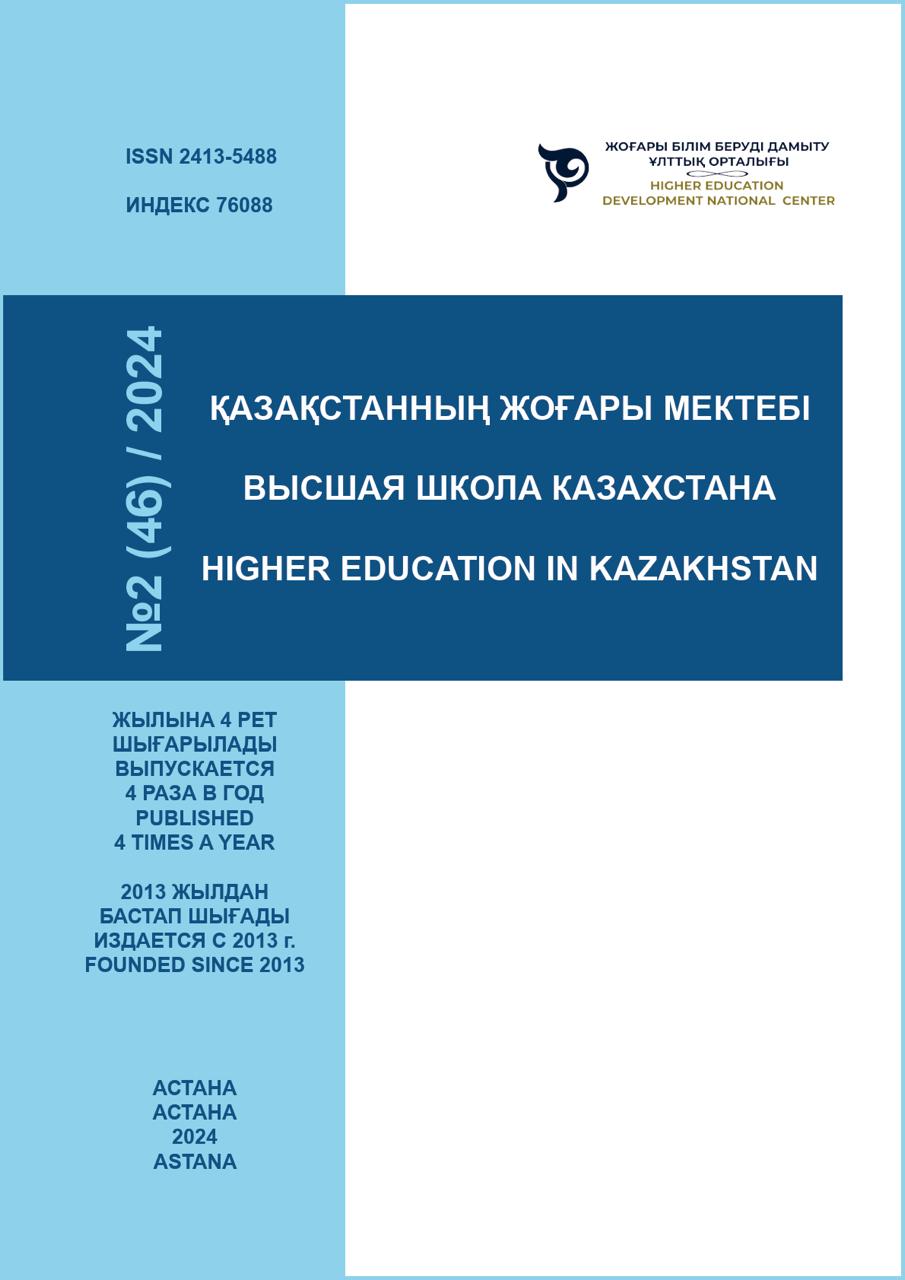PEDAGOGICAL RESEARCH IN KAZAKHSTAN: ANALYSIS OF SCIENTIFIC PUBLICATIONS IN SCOPUS
DOI:
https://doi.org/10.59787/2413-5488-2024-46-2-38-55Abstract
The relevance of this study is determined by the intensive development of pedagogical sciences in Kazakhstan. The aim of the work is to analyze trends in pedagogical research in Kazakhstan based on data from the Scopus database for the period from 2010 to 2023. The research methodology includes the collection of data on the keywords "pedagogy" and "Kazakhstan," their preliminary processing, and statistical analysis using SPSS to identify the main trends and directions of development in this scientific field. The results showed a gradual increase in the number of publications from one paper in 2010 to 17 in 2022, indicating an increased scientific interest in pedagogy in Kazakhstan. The geographical analysis revealed the leading role of Kazakhstan with 80 publications, as well as significant contributions from researchers from the Russian Federation, the United States, and other countries, emphasizing the international importance of Kazakh pedagogical research. The thematic analysis of keywords confirmed the wide range of topics studied and the multidisciplinary approaches, highlighting educational reform, multilingualism in teaching, and the introduction of innovative technologies into the educational process as the main directions. The conclusions of the study emphasize the theoretical and practical importance of analyzing pedagogical publications for the further development of educational science in Kazakhstan and emphasize the need to continue comprehensive interdisciplinary research in this area
References
Akkaya, G. and Ertekin, P. (2021). İki kere farklı bireylere yönelik literatürün görsel olarak ı̇ncelenmesi: bibliyometrik bir çalışma. Pamukkale University Journal of Education. https://doi.org/10.9779/pauefd.706012
Armstrong-Mensah, E., Ramsey-White, K., & Alema-Mensah, E. (2019). integrative learning in us undergraduate public health education: a review of student perceptions of effective high-impact educational practices at georgia state university. Frontiers in Public Health, 7. https://doi.org/10.3389/fpubh.2019.00101
Askarkyzy, S., Želvys, R., Algozhaeva, N., & Toibayev, A. (2017). Shifts in governance of universities in kazakhstan: the case study. Pedagogika, 128(4), 258-267. https://doi.org/10.15823/p.2017.68
Cai, H. and Liu, G. (2022). Exploring the learning psychology mobilization of music majors through innovative teaching methods under the background of new curriculum reform. Frontiers in Psychology, 12. https://doi.org/10.3389/fpsyg.2021.751234
Chinibayeva, G., Aiman, B., & Anarmetov, B. (2020). Theoretical and methodological foundations for the development of comparative pedagogy. Propósitos Y Representaciones, 8(SPE2). https://doi.org/10.20511/pyr2020.v8nspe2.652
Cruz-Lovera, C., Perea-Moreno, A., Cruz-Fernández, J., Bermejo, J., & Manzano‐Agugliaro, F. (2017). Worldwide research on energy efficiency and sustainability in public buildings. Sustainability, 9(8), 1294. https://doi.org/10.3390/su9081294
Eli, T. (2021). Students` perspectives on the use of innovative and interactive teaching methods at the university of nouakchott al aasriya, mauritania: english department as a case study. international Journal of Technology innovation and Management (Ijtim), 1(2), 90-104. https://doi.org/10.54489/ijtim.v1i2.21
Evans, C., Howson, C., Forsythe, A., & Edwards, C. (2020). What constitutes high quality higher education pedagogical research?. Assessment & Evaluation in Higher Education, 46(4), 525-546. https://doi.org/10.1080/02602938.2020.1790500
F, F., Harefa, N., & Limbong, M. (2022). Description of increasing the number of research and publication of lecturers at the indonesian christian university, east jakarta. Tadbir Jurnal Studi Manajemen Pendidikan, 6(2), 333. https://doi.org/10.29240/jsmp.v6i2.5374
Garwood, D. and Poole, A. (2021). Fairising pedagogical documentation for the research lifecycle., 65-72. https://doi.org/10.1007/978-3-030-71903-6_7
Hanley, N. (2021). The contribution of empathy-based pedagogy in global citizenship education: kazakhstani context. international Journal of Development Education and Global Learning, 13(2). https://doi.org/10.14324/ijdegl.13.2.02
Joensuu-Salo, S., Peltonen, K., Hämäläinen, M., Oikkonen, E., & Raappana, A. (2020). Entrepreneurial teachers do make a difference – or do they?. industry and Higher Education, 35(4), 536-546. https://doi.org/10.1177/0950422220983236
Jumakulov, Z. and Ashirbekov, A. (2016). Higher education internationalization: insights from kazakhstan. The Hungarian Educational Research Journal, 6(1), 37-59. https://doi.org/10.14413/herj.2016.01.03
Kabbassova, A., Shakarmanova, M., Temerbayeva, Z., Bulyga, L., & Sakenov, J. (2021). Meta-subject potential of a foreign language in teaching natural disciplines at a pedagogical university. international Journal of Education and Practice, 9(2), 310-322. https://doi.org/10.18488/journal.61.2021.92.310.322
Kenzhetaeva, R., Nurzhanova, S., Beimisheva, A., Stambekova, A., Ryabova, E., & Kulbayeva, D. (2020). Features of the transition from the traditional to the criterial assessment in schools of kazakhstan. international Journal of Cognitive Research in Science Engineering and Education, 8(3), 73-81. https://doi.org/10.23947/2334-8496-2020-8-3-73-81
Kewalramani.S. and Havu-nuutinen, S. (2019), Preschool teachers' beliefs and pedagogical practices in the integration of technology: A case for engaging young children in scientific inquiry. Eurasia Journal o) Mathematics Science and Technology Ed"jation,15(12).https://doi.org/10.29333/emste/109949
Kussainov, A. (2021). Overcoming the anxiety of schoolchildren in the process of distance learning. Bulletin Series of Pedagogical Sciences, 72(4), 165-175. https://doi.org/10.51889/2021-4.1728-5496.20
Yakavets, N., Bridges, D., & Shamatov, D. (2017). On constructs and the construction of teachers’ professional knowledge in a post-soviet context. Journal of Education for Teaching international Research and Pedagogy, 43(5), 594-615. https://doi.org/10.1080/02607476.2017.1355086
Yan, Z., Han, F., Gao, R., Qi, J., Gao, Q., & Cai, W. (2022). Impact of public health education on the health status of the older migrant population. Frontiers in Public Health, 10. https://doi.org/10.3389/fpubh.2022.993534
Yilmaz, Ö. and Bayraktar, D. (2014). Teachers’ attitudes towards the use of educational technologies and their individual innovativeness categories. Procedia - Social and Behavioral Sciences, 116, 3458-3461. https://doi.org/10.1016/j.sbspro.2014.01.783
Želvys, R., Aganina, K., & Zhunusbekova, A. (2014). Development of the system of education management in the republic of kazakhstan. Pedagogika, 115(3), 25-38. https://doi.org/10.15823/p.2014.025
Zhang, J. (2020). The application of human comprehensive development theory and deep learning in innovation education in higher education. Frontiers in Psychology, 11. https://doi.org/10.3389/fpsyg.2020.01605
Zhilbaev, Z., Syrymbetova, L., Zhetpisbayeva, B., Zhetpisbayeva, M., & Akbayeva, G. (2016). The role of international comparative studies in the development of the kazakhstan education system. Novosibirsk State Pedagogical University Bulletin, 6(4), 119-133. https://doi.org/10.15293/2226-3365.1604.11

Downloads
Published
Issue
Section
License
Copyright (c) 2024 Scientific and analytical journal "Higher school of Kazakhstan"

This work is licensed under a Creative Commons Attribution-ShareAlike 3.0 Unported License.





